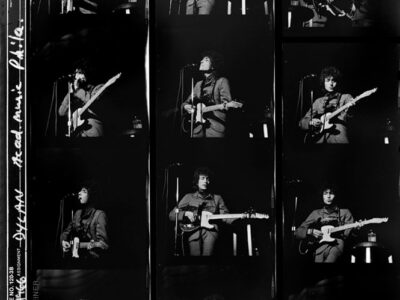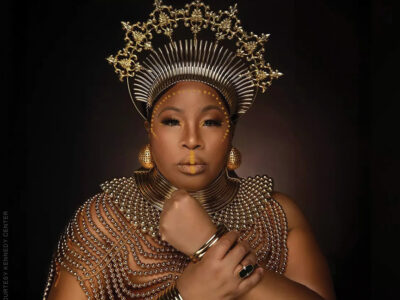
A long-dormant opera by Penn music professor Jay Reise rises again in Russia.
By Karen Rile
Related Link | “Jay Reise’s Encounter with a Russian Monk,” The Pennsylvania Gazette, November 1988 (PDF)
Grigory Rasputin did not die easily. Poisoned, shot four times, and badly beaten by assassins, it wasn’t until he was thrown into the icy Neva River that the mystical Russian monk finally expired.
Rasputin, the opera by Penn music professor Jay Reise G’75, has shown a similar tenacity. Commissioned in 1985 by the late Beverly Sills for the New York City Opera, it appeared to have breathed its last aria after being performed at Lincoln Center in 1988. Embraced by a few critics, it was stabbed and bludgeoned by others, and booed by some members of the audience before being tossed into the river of neglect.
But Rasputin has sprung to life again, this time in the mother country of its eponymous anti-hero, through a lavishly staged production by Moscow’s Helikon Opera Theater. The Moscow Times, the city’s English language daily, called it a “well-crafted piece, both musically and dramatically,” and hailed the staging, by artistic director Dmitry Bertman, as “among the very best he has produced in all of Helikon’s 18 years on the Moscow operatic scene.” The “superbly disciplined effort,” the paper added, “vividly brings to life the final days of the Romanovs’ imperial reign.”
Not bad for an American who had never written an opera before this one.
“At first it hadn’t really occurred to me how unusual it was, to be an American composer presenting a work on a Russian theme, on Russian soil,” said Reise in early November. He had recently returned from the first week of performances in Moscow, where he had been immersed in press conferences and television interviews. (He will return for a second run that begins later this month.) “As far as I’m aware,” he added, “this is the first time an American opera has been performed in Russia.”
Behind the scenes, Rasputin’s creator had been busy for years. On a 1994 trip to Moscow, Reise handed a cassette recording of the 1988 New York production and a copy of his libretto and score to Bertman, who vowed to bring Rasputin to the stage. Fourteen years later, during which the Helikon had grown into one of the major opera houses in Moscow, Bertman unveiled his Russian-language production.
For Reise, it was well worth the wait to see his opera performed in Russia, just a stone’s throw from the Kremlin (albeit in temporary quarters while the Helikon Theater completes a renovation). The Soviet Union may have come and gone since Rasputin was murdered on the eve of the Russian Revolution, but the Mad Monk’s memory still excites strong emotions in his motherland—from religious conservatives determined to censure any negative portrayal of Tsar Nicholas II and his family (who have been canonized by the Russian Orthodox Church) to critics of former Prime Minister Vladimir Putin, who see parallels between those who manipulated the Romanovs and those who would manipulate the current regime.
Though Reise drew on actual events, he makes it clear that Rasputin was never intended to be a political commentary or a precise historical account.
“I was interested in the legend of Rasputin,” says Reise. And who wouldn’t be? Filled with jealousy, murder, and political upheaval, that story seems ready-made for opera. Born to a peasant family in Siberia, Rasputin was a self-styled mystic from an underground Christian sect whose rituals reportedly included orgies and self-flagellation. In the final years of the Romanovs, Rasputin insinuated himself into their confidence by using hypnosis to alleviate the suffering of the hemophiliac Prince Alexis, and unwittingly helped bring about the royal family’s destruction.
Unlike the opera’s first production in New York, when Reise attended every rehearsal from the first piano reading, he had no such luxury in the Moscow debut. This time he arrived—a bit anxiously—just in time to see the finished product. But any worries were quickly put to rest.
“Rasputin is conceived in a series of linear scenes, with a constant sense of forward motion,” says Reise. “The music is very agitated, always moving ahead. The music director, Vladimir Ponkin, picked up on this idea very well. And he conducted the entire score from memory!”
Reise was delighted with the level of musicianship, both vocal and instrumental, at the Helikon. The leads include Nikolai Galin in the title role and Natalya Zagorinskaya, the Helikon’s longtime lead soprano, as Tsarina Alexandra.
“In October they used two-and-a-half casts of singers for a total of five performances,” he notes. “The orchestra was very large, but the balances were excellent. You could hear everything.
“The [Helikon’s] visuals are incredible,” he adds. “The designers, Ignor Nezhny and Tatiana Tulubieva, created complicated sets on a tilted, revolving stage with several different scenes within each act.”
On one set, giant Fabergé eggs crowd the stage, amidst the scattered shards of broken egg crates, symbolizing the contrast between the opulent luxury of the court and the poverty of the peasant class. “The singers had to climb around the eggs, as if they were being suffocated by their great wealth,” Reise explains.
In the orgy scene, the chorus wears flesh-colored body suits, complete with stitched, knobby spines and fabric genitals. During the final scene, the mob hold quivering red balloons, which burst like gunshots as a projected photo of the royal family is extinguished.
By contrast, the original New York City Opera production featured grim, realistic violence and full nudity. One critic dismissed the staging as “neo-Brechtian,” and audiences and critics seemed polarized in their reaction to the production and to Reise’s challenging score.
“As the curtain falls on the opening-night performance, applause is tempered by some boos and hisses, in turn eliciting a ripple of reaction from the crowd,” wrote the Gazette’s Peter Ross [“Jay Reise’s Encounter with a Russian Monk,” November 1988]. “The singers are received well. Reise is greeted respectfully, if not with wild abandon. When director [Frank] Corsaro takes the stage, he is booed—if not en masse, roundly—and he reacts first by cupping his hands around his mouth to form a bullhorn and booing back, then by shaking his fist vigorously at his detractors.”
“There were loud boos and louder bravos,” wrote Octavio Roca in The Washington Times. He praised the opera’s bursts of lyricism, calling the score “spellbinding, challenging, and profoundly beautiful.” At the other end of the spectrum, New York Times critic Donal Henahan pronounced the work “devoid of lyrical interest, in the late-century international manner.”
Reise was particularly aggravated by Henahan’s charge that the piece was primarily atonal, which is “simply not true,” he told the Gazette in 1988. “It’s mostly tonal, and the atonality springs from other things—it’s always an extension.”
He was presumably happier with the recent review by The Moscow Times, which noted: “Especially effective is Reise’s use of traditional tonality—including quotes from Pyotr Tchaikovsky’s ballet Swan Lake and the Russian imperial hymn—for the music of Nicholas and Alexandra, as well as atonal dissonance to conjure up what he calls, in a program note, ‘the brutal and chaotic new world of the 20th century.’”
The life of every artist is bedeviled with uncertainty as to whether his or her work will remain accessible to future audiences. A classical opera—by definition expensive and difficult to produce—is particularly vulnerable to extinction through neglect. The current revival of Rasputin, produced with great freshness and energy by the Helikon, 20 years after its first and only prior production, is remarkable. Perhaps even more remarkable is that the new production occurs “on-site,” in a location that would have been unthinkable at the time of its original commission.
Karen Rile C’80, a frequent contributor to the Gazette, teaches writing at Penn.




